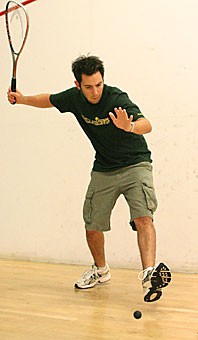Innsbruck, Austria. Bombay, India. Windhoek, Namibia. Auckland, New Zealand. Tucson, Ariz.?
Twice a week, a forgotten corner of the Student Recreation Center sees these five continents intersect when about a dozen students come together from all parts of the globe in celebration of a sport that many Americans have never even heard of: squash.
“”It’s quite an eclectic bunch,”” said sophomore Andrew McLaren, president and co-founder of the squash club, one of Arizona’s newest sport clubs, which began last year.
Every Monday and Thursday evening, as the gym teems with the racquetball playing multitudes, the club plants their flag in the Rec Center’s squash courts, located on the second story.
One member of the international mix is freshman Kunal Maneck, who played for the junior national team in his home country of India and was ranked as high as No. 15. Maneck didn’t even bother to bring his racquet when he came to Arizona.
“”I didn’t expect to play over here,”” he said.
Even though Maneck has played in Pakistan and Singapore, Arizona seemed to exist outside the squash universe, but thanks to McLaren’s club, players like Maneck have found a squash home.
“”That was most unexpected,”” Maneck said.
As a New Zealand exchange student, senior Mark Russell also hails from a squash-playing nation.
“”It’s quite a big sport there,”” he said.
But Russell was a bit baffled by the university’s seemingly squashless condition.
“”I’d never even heard of racquetball,”” he said. “”I came over and I thought, ‘Hey, let’s play some squash, I see all the courts here,’ and I saw all these people playing racquetball, and I was like, ‘What are you guys playing?'””
But Russell’s quest for a good squash game didn’t just run into trouble at the Rec Center. He soon found that even finding squash equipment was going to be a challenge.
“”I’ve been out to a few department stores and sports stores asking for squash racquets,”” he said. “”Half the time they don’t even know what I’m talking about. I’ve been to about five or six different stores, and not one has had a squash racquet.””
Although the small number of courts and general lack of exposure keeps larger meetings difficult, McLaren remains upbeat about the expansion of the sport at the university. For McLaren, the club is not only a haven for squash players attending the university, but also an opportunity for newcomers to learn the sport.
“”It’s a nice social sport,”” he said. “”It’s a nice way to meet people and also meet people from different backgrounds since it’s such an international sport.””
An indoor racquet sport invented in 19th-century England, squash has fanned across the globe with the British Empire. Today the sport is played in more than 120 countries, according to the Australian Sports Commission.
McLaren learned the game from his father, who brought his love for the sport with him from South Africa. But although squash is internationally popular, in the U.S. organized play is largely limited to the Eastern seaboard, and the game remains almost a non-entity in the Western regions of the country.
Although squash is definitely played more abroad, the uninitiated could easily recognize the sport as a close cousin to racquetball. The basic principle is the same: pick up a racquet, walk into an enclosed area and smack the ball off the front surface so that your opponent cannot return it.
“”The most natural thing is to get people who play racquetball to convert to squash,”” McLaren said. “”If you’ve played racquet sports in the past, it doesn’t take too long to develop the necessary skills to play squash. You can get a pretty intense game going.””
But the differences become apparent in the form of the ball, McLaren said.
Although a racquetball is about twice the diameter of a squash ball, the squash ball is also much denser and has less bounce than its excitable cousin. It might be fun to watch a racquetball ricochet from wall to wall, but the end result in squash is much more work, and therefore a much better workout.
An hour of squash is estimated to burn between 700 and 1,000 calories, 70 percent more than either tennis or racquetball.
“”Because the court’s a lot smaller and the ball doesn’t bounce nearly as much, the game is played at a much faster pace,”” Russell said.
McLaren added, “”You really have to go after the ball.””
The club’s vice president, sophomore Dan Huebner, made a stronger assessment.
“”Squash is a thousand times better than racquetball in every way possible,”” he said.
Adding to the endurance needed to run down a ball that is not naturally mobile is the large tin strip that lines the bottom of the back wall in a squash court. Because the tin area is out of play, it is much harder to kill a squash ball with a well-placed shot than in racquetball; the result is longer and harder rallies.
“”You’re running around a hell of a lot more,”” Russell said.
The squash club is largely devoted to pickup games right now while the club builds a solid core of players.
“”It’s in its infancy,”” McLaren said. “”We’re still pretty recreational.””
But the club doesn’t rule out future participation in tournaments outside the university, starting with sending representatives to play against squash clubs in Phoenix.
In the meantime, players like Russell and McLaren are happy to enjoy playing a game that they love with good friends, as well as not having to wait for a racquetball court.
“”It’s a really great game,”” McLaren said. “”If there’s one thing I could say, it’d just be that it’s smaller, faster and international.””









